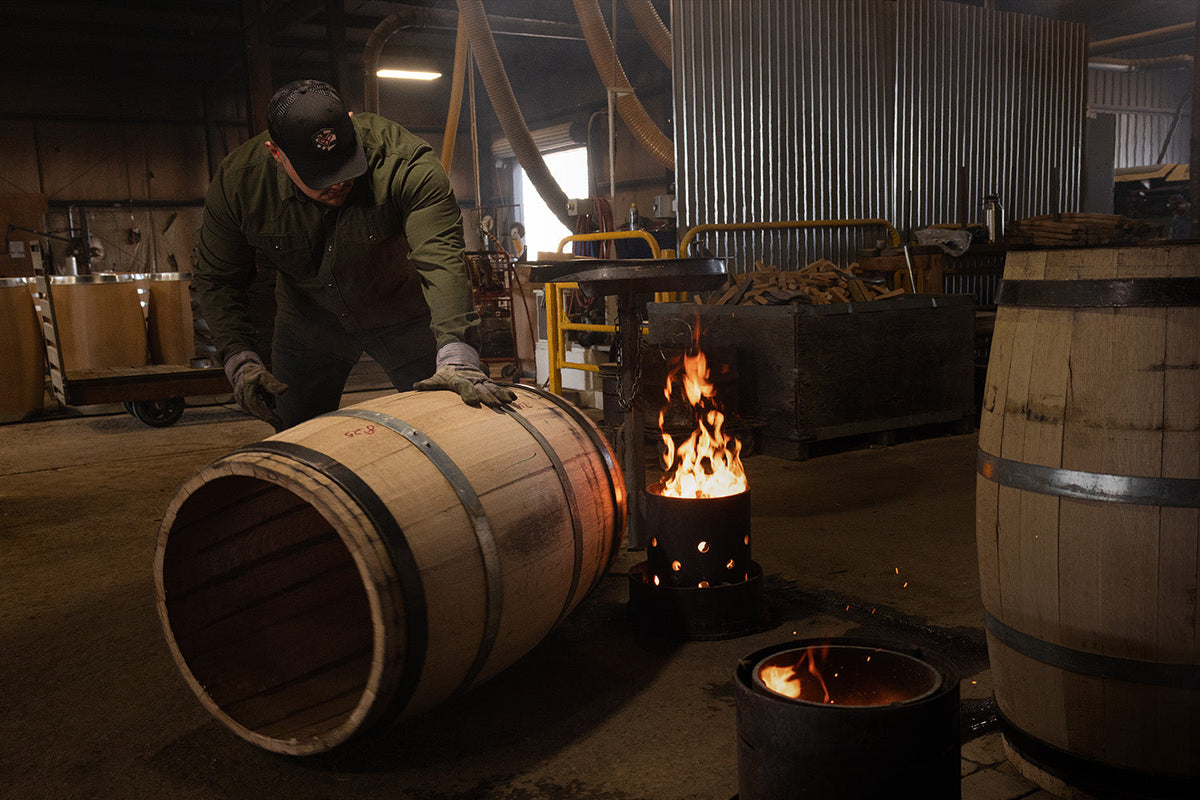
Barrel to Bottle: Crafting Kentucky Bourbon
|
|
Tiempo de lectura 4 min
Carrito
Su carrito está vacío
|
|
Tiempo de lectura 4 min
There’s deep satisfaction in hard work. One product that takes back-breaking work and expert skills from start to finish is Kentucky bourbon.
Bourbon is a classic all-American whiskey, made on American soil and enjoyed all over the nation. While it takes simple ingredients like grain, yeast, and water to make bourbon, the expert production methods are far from easy to master.
Today, the centuries-old bourbon process relies on three key industries—farming, cooperage, and distilling. This network of grain fields, barrel factories, and distilleries is powered by experienced, dedicated people who take great pride in their work.
That pride can be felt in the quality of the final product.
Richard Smith comes from humble beginnings. Raised in a rental house with only the basics, he has worked his whole life to establish a legacy for his children and grandchildren. In 1987, he achieved a major milestone by buying the land that would become the Smith Family Farm, a place to harvest grains and other crops with the help of his family.
Grain is the main ingredient in whiskey. Grown in rich soil, Smith’s high-quality wheat and corn are vital to making a genuine Kentucky bourbon. Aside from the fact that his grain is his livelihood, Smith feels a strong sense of duty to keep his farm running.
“It’s more than just a generational farm,” Smith explains. “It’s a multigenerational legacy we can all be proud of.” “We have core values here—our faith in God, and our family,” Smith adds. “And we understand the importance of keeping this farm and passing it down through the generations.”
Smith has seen countless families lose their farms, some by choice, some because their costs became too high. Over the years, this has been a reminder of the meaning of hard work and the importance of fighting to keep traditions alive.
“Over the years we’ve seen so many people sell the farm for money, and when the money gets spent, they don't have that legacy to go back to,” Smith says. “Once it's gone, it's gone. Before long, it’s just a memory. That's what I try to impress on my family.”
In the heart of a Fresno workshop, Jonathan Gonzalez and a crew of coopers combine oak and fire to turn wood into charred barrels that will house the bourbon as it ages. At Barrels Unlimited, Gonalez and his team make barrels that are more than just useful—they’re works of craft that help give bourbon its deep flavor and character. Through this craft, Gonzalez is continuing a tradition handed down to him from his father.
“I’ve worked here making barrels with my dad for years,” Gonzalez shares. “He taught me everything I know.” Getting consistent results in an ever-changing environment isn’t easy, but the team has years of experience under their belts. They quickly adapt to a range of challenges from material shortages to changes in climate that can affect the shape and flexibility of the wood.
There are no training programs for cooperage. The only way to become a cooper is through the one–on–one, hands–on teachings of a seasoned cooper. Pride and well-honed skill run through every step in this process, from shaping the staves to charring and sealing the barrels.
“There’s a lot of pride with all the guys here, especially since we’ve been doing this for so long together,” Gonzalez explains. “We know how to get it done the right way. It feels good to make something great.”
In a historic distillery in the heart of Louisville, the farmers’ crops and coopers’ barrels are put to work. Under the guidance of master distiller Caleb Kilburn, the Kentucky Peerless Distilling Company blend tradition and craft to create an iconic Kentucky bourbon.
“Making bourbon is incredibly specialized—it's really an art form,” Kilburn says. “We’re all well–trained in knowing what the whiskey's telling us. It's strictly the palette and the taste at the end of the day that lets you know how you did.”
Kentucky Peerless isn’t like most distilleries. To start, they use a “sweet mash” that gives their whiskey a softer, more floral taste. They also distill and age their bourbon at a lower proof, which lets it soak up more flavor and develop its own unique character.
There’s a rich history in the founding and continuation of Kentucky Peerless. Carson Taylor, president of Kentucky Peerless Distilling Company, is the great-great-grandson of Henry Kraver, founder of the first Peerless distillery in 1889. While that distillery closed in the early 1900s, Carson and his father revived the family business.
“I’m driven by family succession,” Taylor explains. “I'm fifth generation. I have three kids, and hopefully they want to be involved in it someday.”
“And I want us to put out the best product we can,” he continues. “We’re just a small family-owned place competing with the big boys, but we've put our stake in the ground and have proven ourselves. This is all about the future. It’s the legacy we want to build.”
When we take a bottle of the best Kentucky bourbon off the shelf, it’s easy to forget all the skilled hands that tended the fields, shaped the barrels, and guided the distillation process to bring that bottle to life. It stands for traditions that are maintained through raw effort and determination. It also represents a connection between the past, present, and future—created by those who are relentlessly committed to their craft and know the value of honest, hard work.









